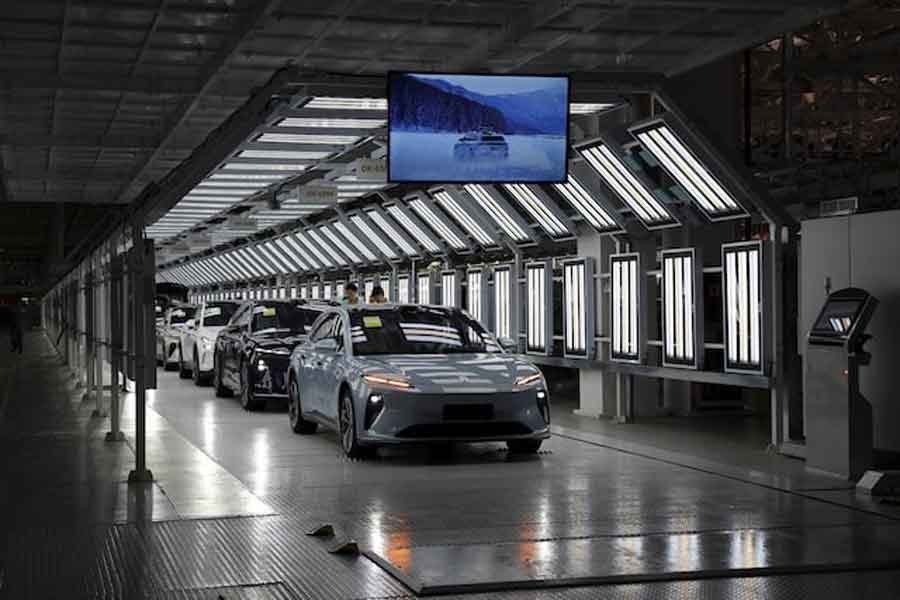Saif
Senior Member
- Messages
- 14,377
- Reaction score
- 7,589
- Origin

- Residence

- Axis Group

Date of Event:
Jul 17, 2025

China vows to regulate 'irrational' competition in EV industry
China's cabinet on Wednesday pledged to regulate what it called "irrational" competition in the country's electric vehicle industry, vowing to strengthen cost investigation and price monitoring, according to state broadcaster CCTV. The cabinet meeting, presided by Chinese Premier Li Qiang, was hel
China vows to regulate 'irrational' competition in EV industry
REUTERS
Published :
Jul 16, 2025 23:38
Updated :
Jul 16, 2025 23:38

Employees work on the production line at a factory of Chinese electric vehicle (EV) maker Nio in Hefei, Anhui province, China April 2, 2025. Photo : REUTERS/Florence Lo/Files
China's cabinet on Wednesday pledged to regulate what it called "irrational" competition in the country's electric vehicle industry, vowing to strengthen cost investigation and price monitoring, according to state broadcaster CCTV.
The cabinet meeting, presided by Chinese Premier Li Qiang, was held as a two-year price war in the world's largest auto market only intensifies.
Stay up to date with the latest news, trends and innovations that are driving the global automotive industry with the Reuters Auto File newsletter. Sign up here.
China will focus on promoting the high-quality development of the electric vehicle industry and implement comprehensive measures in both the short- and long-term to address the "phenomenon of irrational competition" in the sector, CCTV quoted the cabinet as saying, without giving further details.
The cabinet will also urge the main automakers to fulfil commitments on supplier payment terms and promised to help them boost competitiveness through technological innovation and quality improvement.
Industry regulators and executives have previously warned of excessive competition and called on automakers to halt the bruising price war which they say threatens the sector's health and sustainable development.
Concerns about oversupply persist, with new vehicles being shipped overseas as "used" since 2019, according to a Reuters report in late June.
Separately, the cabinet meeting discussed boosting domestic consumption, with policymakers vowing to systematically remove unreasonable restrictions that hinder household spending and optimise policies for a consumer goods trade-in program.
REUTERS
Published :
Jul 16, 2025 23:38
Updated :
Jul 16, 2025 23:38
Employees work on the production line at a factory of Chinese electric vehicle (EV) maker Nio in Hefei, Anhui province, China April 2, 2025. Photo : REUTERS/Florence Lo/Files
China's cabinet on Wednesday pledged to regulate what it called "irrational" competition in the country's electric vehicle industry, vowing to strengthen cost investigation and price monitoring, according to state broadcaster CCTV.
The cabinet meeting, presided by Chinese Premier Li Qiang, was held as a two-year price war in the world's largest auto market only intensifies.
Stay up to date with the latest news, trends and innovations that are driving the global automotive industry with the Reuters Auto File newsletter. Sign up here.
China will focus on promoting the high-quality development of the electric vehicle industry and implement comprehensive measures in both the short- and long-term to address the "phenomenon of irrational competition" in the sector, CCTV quoted the cabinet as saying, without giving further details.
The cabinet will also urge the main automakers to fulfil commitments on supplier payment terms and promised to help them boost competitiveness through technological innovation and quality improvement.
Industry regulators and executives have previously warned of excessive competition and called on automakers to halt the bruising price war which they say threatens the sector's health and sustainable development.
Concerns about oversupply persist, with new vehicles being shipped overseas as "used" since 2019, according to a Reuters report in late June.
Separately, the cabinet meeting discussed boosting domestic consumption, with policymakers vowing to systematically remove unreasonable restrictions that hinder household spending and optimise policies for a consumer goods trade-in program.



